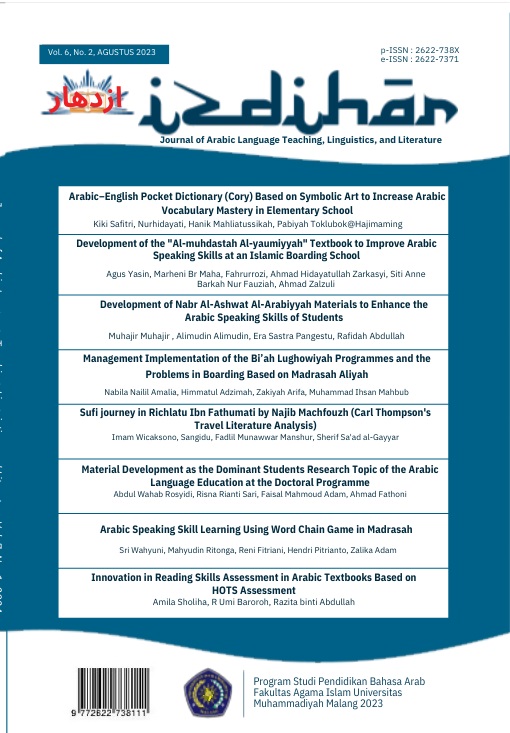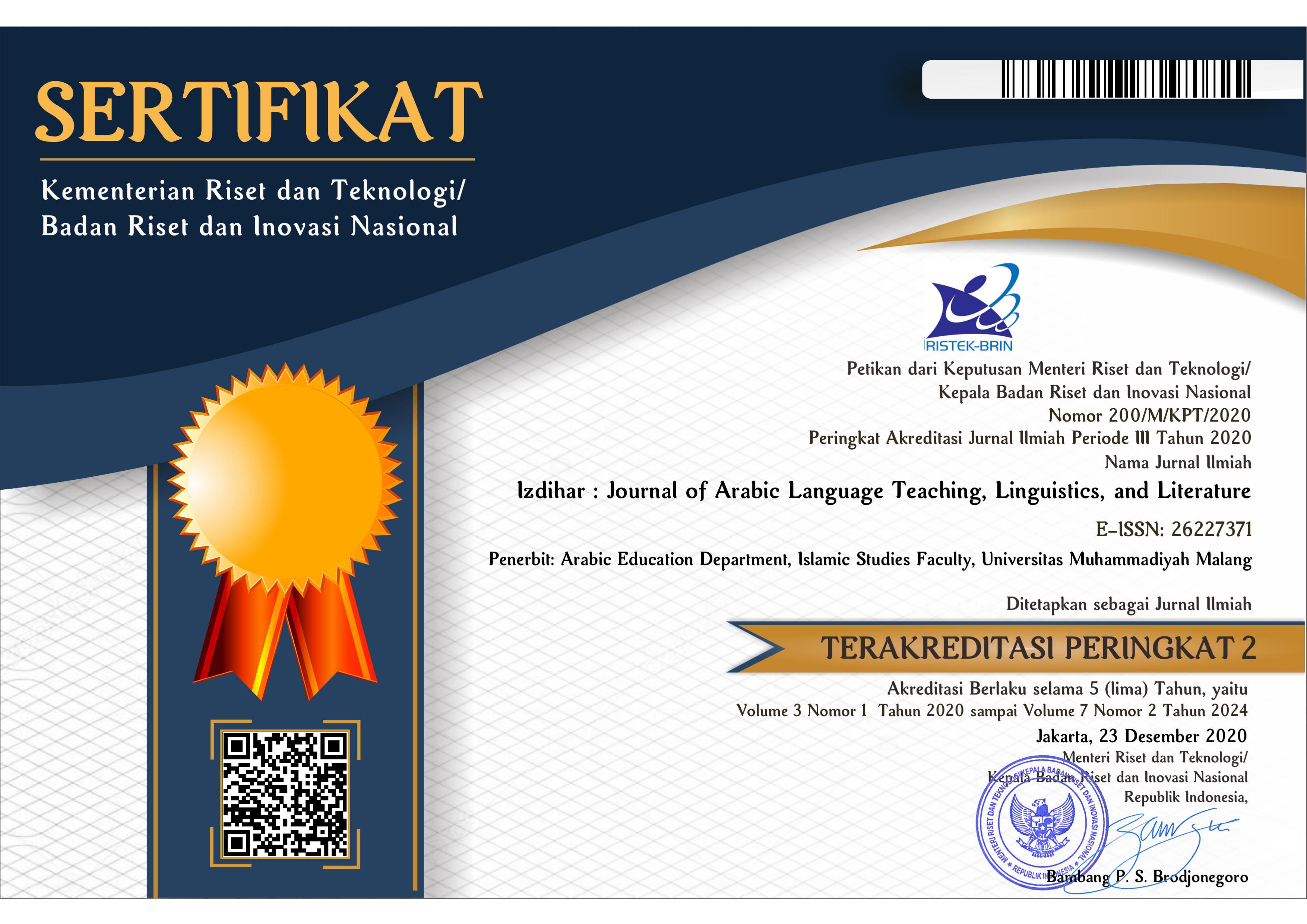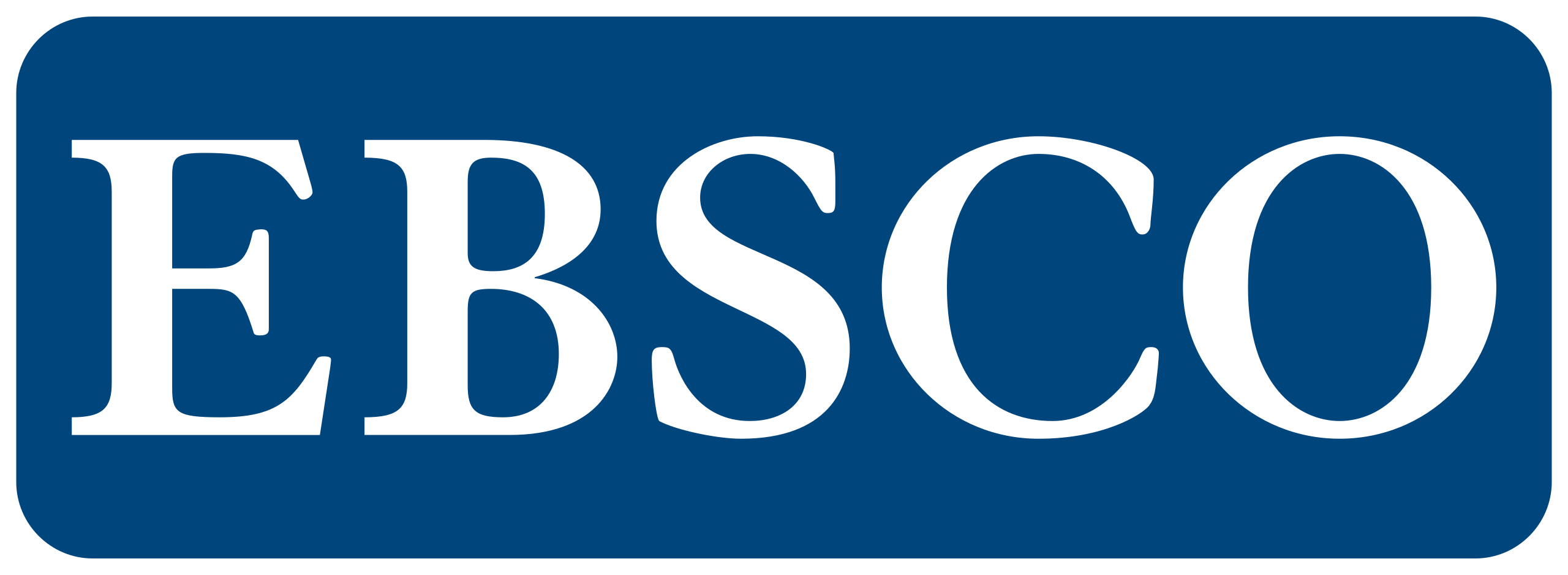Material Development as the Dominant Students Research Topic of the Arabic Language Education at the Doctoral Programme
DOI:
https://doi.org/10.22219/jiz.v6i2.24346Keywords:
Dynamics-thought ; development; learning Arabic; DissertationAbstract
The aim of this study was to classify the results of the dissertation, describe the research method, and present the final findings. The research method used descriptive analysis with the main dissertation data for 2012–2022, using the Milles and Huberman model analysis technique. The research result was that the focus of the dissertation study spread to ulum al-lughah and maharah al-lughah; however, it swelled to the development of teaching materials. The dissertation was written using qualitative and quantitative research models, with the type of R&D development model adapted by Borg and Gall as the majority. The final dissertation formulation looked at the characteristics of the teaching materials in each approach, theory, and frame used. For the feasibility of teaching material products at a feasible level and effectively improving language skills and knowledge. From the results of the assessment, there was no expert validation, which showed low results, and the effectiveness test failed.
Downloads
References
Ainin, M. (2016). Metodologi Penelitian Bahasa Arab. CV. Bintang Sejahtera,.
Al-Ghulayaini, Mustafa. 2005. Jami’ al-Duruus al-Arabiyyah. Daar al-Kutub al-Ilmiyyah.
Ali Alnaied, Mosa Elbendak, Abdullah Bulbul. (2020).An intelligent use of stemmer and morphology analysis for Arabic information retrieval. Egyptian Informatics Journal,Volume 21, Issue 4, https://doi.org/10.1016/j.eij.2020.02.004
Anton Baker, dan Achmad Charis Zubair. (tt). . Metodologi Penelitian Filsafat. Kanisius.
Arifa, Z., & Al Faruq, U. (2021). Mapping the Research Theme and Method: A Corpus Based to Abstract of Arabic Education Undergraduate Program. Arabiyatuna : Jurnal Bahasa Arab, 5(1), 81. https://doi.org/10.29240/jba.v5i1.2073
Arikunto, S. (2010). Prosedur Penelitian-Suata Pendekatan Praktik. Rineka Cipta.
Baburhan Uzum, Bedrettin Yazan, Samar Zahrawi, Siham Bouamer, Ervin Malakaj. (2021). A comparative analysis of cultural representations in collegiate world language textbooks (Arabic, French, and German). Linguistics and Education,Volume 61, https://doi.org/10.1016/j.linged.2020.100901
Bassam Haddad, Ahmad Awwad, Mamoun Hattab, Ammar Hattab. (2023). PRo-Pat: Probabilistic Root–Pattern Bi-gram data language model for Arabic based morphological analysis and distribution. Data in Brief,Volume 46, https://doi.org/10.1016/j.dib.2022.108875
Batmang, “Pendekatan Transdisipliner (Suatu Alternatif Pemecahan Masalah Pendidikan),” J. Al-Ta’dib, vol. 9, no. 2, pp. 44–54, 2016.
Batubara, K. Z. A., Daulay, H. P., & Dahlan, Z. (n.d.). Peradaban Dan Pemikiran Islam di Indonesia. 13.
Damayanti, Desy., Fauzi, Adin & Inayati, A.M. (2018). LEARNING MATERIALS: THE “NUCLEUS” OF LANGUAGE TEACHING. Journal of English Education 1-8. https://doi.org/10.31327/jee.v3i1.417
Djajasudarma, F. (2010). Metode Linguistik-Ancangan Metade dan Kajian. Aditma.
Effendy, F. A. (2009). Metodologi Pengajaran Bahasa Arab. Malang: Misykat.
Ghofur, Abdul. (2017). Dinamika Kajian Pendidikan Bahasa Arab Dalam Sripsi Mahasiswa Program Studi Pendidikan Bahasa Arab Antara Tahun 2010-2014 Fakultas Ilmu Tarbiyah Dan Keguruan IAIN Surakarta. ARABIYATUNA : Jurnal Bahasa Arab., 1. 101. https://doi.org/10.29240/jba.v1i1.,173
Jos Daniel Parera,. (1991). Kajian Linguistik Umum, Historis, Komparatif Dan Tipologi Struktural. Erlangga.
Kemeterian Agama RI. (2019). Keputusan Menteri Agama Nomor 183 Tahun 2019 tentang Kurikulum Pendidikan Agama Islam dan Bahasa Arab pada Madrasah. DIREKTORAT KSKK MADRASAH DIREKTORAT JENDERAL PENDIDIKAN ISLAM KEMENTERIAN AGAMA REPUBLIK INDONESIA 2019.
Khambali, Imam Asrori, Abdul Wahab Rosyidi, Nurhasanah . (2023). Analysis of Teaching Materials for Arabic Textbooks for Islamic Junior High School Based on CEFR Standards. Arabiyat : Jurnal Pendidikan Bahasa Arab dan Kebahasaaraban | Vol. 10. https://doi.org/10.15408/a.v10i1.30439
Laborda, Jesús García. (2011). Revisiting Materials for Teaching Languages for Specific Purposes. 3L: The Southeast Asian Journal of English Language Studies – Vol 17(1):102 –112 Language and Translation. Volume 2, Number 2, (pp.1-12)
Miles, B. Matthew & Huberman, A. Michael. (1992). Analisis data Kualitatif, Terj. Tjetjep Rohendi. Universitas Indonesia -UI Press.
Mubiina Munief, M. F., Ayu Kamila, C., & Abdul Firman, R. (2021). Manajemen Pengembangan Kemampuan Bahasa Arab pada Madrasah. Jurnal Pendidikan Indonesia, 2(9), 1563–1571. https://doi.org/10.36418/japendi.v2i9.296
Muhammad Dawud & Uril Bahrudin. (2018). Al Arabiyah Ilmu Al Lughoh Al Haditsah. Lisanul Aroby.
Myriam Abdel-Malek,Empowering Arabic learners to make meaning: A genre-based approach. System,Volume 94, https://doi.org/10.1016/j.system.2020.102329
Nikoopour, Jahanbakhsh & Farsani, Mohammad Amini. (2011). English Language Teaching Material Development. Journal of language and translation
Pop, Mirela-Cristina. (2015). Course Material Design Using the New Technologies in Language for Specific Purposes Teaching and Learning. Procedia - Social and Behavioral Sciences, 325-330. https://doi.org/10.1016/j.sbspro.2015.04.774
Roja’ Wahid Duweiri. (2005). Al Bahtsu Al Ilmi, Asaasiyatuhi An Nadhoriyah, Wa Mumarosah Al Ilmiah. Daar Fikr Al Muaashir.
Saeed Salah, Mohammad Nassar, Raid Zaghal, Osama Hamed. (2022). Towards the automatic generation of Arabic Lexical Recognition Tests using orthographic and phonological similarity maps. Journal of King Saud University - Computer and Information Sciences. Volume 34, Issue 10, https://doi.org/10.1016/j.jksuci.2021.02.006
Sami Al-Qatawneh, Ahood Al Rawashdeh. (2019). Gender representation in the Arabic language textbook for the ninth grade approved by the Ministry of Education for use in schools in the United Arab Emirates (UAE). Studies in Educational Evaluation,Volume 60, https://doi.org/10.1016/j.stueduc.2018.12.001
Sami Sulieman Al-Qatawneh, Najeh Rajeh Alsalhi, Mohd. Elmagzoub Eltahir, Omar Ahmed Siddig. (2021).The representation of multiple intelligences in an intermediate Arabic-language textbook, and teachers’ awareness of them in Jordanian schools. Heliyon,Volume 7, Issue 5, https://doi.org/10.1016/j.heliyon.2021.e07004
Setiawan, A. (2021). Bidang Kajian Dan Metode Penelitian Karya Ilmiah Program Studi Pendidikan Bahasa Arab Program Sarjana Universitas Se Jawa Tengah-Yogyakarta (Studi Kasus UIN Sunan Kalijaga, UNSIQ Wonosobo, UNNES dan UMY). Disertasi, Program Studi Pendidikan Bahasa Arab Pascasarjana Universitas Islam Negeri Malang,.
Shabudin, M.,Aisyah, Aznur., Darus, S & Mimiko, Nezu. (2014). Development of Teaching Materials and Utilization of Web 2.0 in Japanese Language Teaching and Learning. Procedia - Social and Behavioral Sciences, 433-441. https://doi.org/10.1016/j.sbspro.2014.02.059
Tanase, Delia. (2015). Specific Criteria in Selecting Input Materials for Teaching the Language of Product Description. Procedia - Social and Behavioral Sciences 543-546. https://doi.org/10.1016/j.sbspro.2015.06.085
Tomlinson, Brian. (2013). Developing Materials for Language Teaching (Second Edition). Bloomsbury.
T. M. De Oliveira, L. Amaral, and R. C. D. S. Pacheco, “Multi/inter/transdisciplinary assessment: A systemic framework proposal to evaluate graduate courses and research teams,” Res. Eval., vol. 28, no. 1, pp. 23–36, 2019, doi: https://doi.org/10.1093/reseval/rvy013
Yongzhi Miao, Okim Kang. (2023). An empirical approach to measuring accent familiarity: Phonological and correlational analyses. System,Volume 116, https://doi.org/10.1016/j.system.2023.103089
Zarah M. Mannaa, Aqil M. Azmi, Hatim A. Aboalsamh. (2022). Computer-assisted i‘raab of Arabic sentences for teaching grammar to students. Journal of King Saud University - Computer and Information Sciences,Volume 34, Issue 10, Part B. https://doi.org/10.1016/j.jksuci.2022.08.020
Downloads
Published
How to Cite
Issue
Section
License
Copyright (c) 2023 Abdul Wahab Rosyidi, Risna Rianti Sari, Faisal Mahmoud Adam, Ahmad Fathoni

This work is licensed under a Creative Commons Attribution-ShareAlike 4.0 International License.
Copyright Notice
Authors who publish with this journal agree to the following terms:
- Authors retain copyright and grant the journal right of first publication with the work simultaneously licensed under a Creative Commons Attribution-ShareAlike 4.0 International License that allows others to share the work with an acknowledgment of the work's authorship and initial publication in this journal.
- Authors are able to enter into separate, additional contractual arrangements for the non-exclusive distribution of the journal's published version of the work (e.g., post it to an institutional repository or publish it in a book), with an acknowledgment of its initial publication in this journal.
- Authors are permitted and encouraged to post their work online (e.g., in institutional repositories or on their website) prior to and during the submission process, as it can lead to productive exchanges, as well as earlier and greater citation of published work (See The Effect of Open Access).
Copyright (c) 2019 Izdihar : Journal of Arabic Language Teaching, Linguistics, and Literature

This work is licensed under a Creative Commons Attribution-ShareAlike 4.0 International License.


















